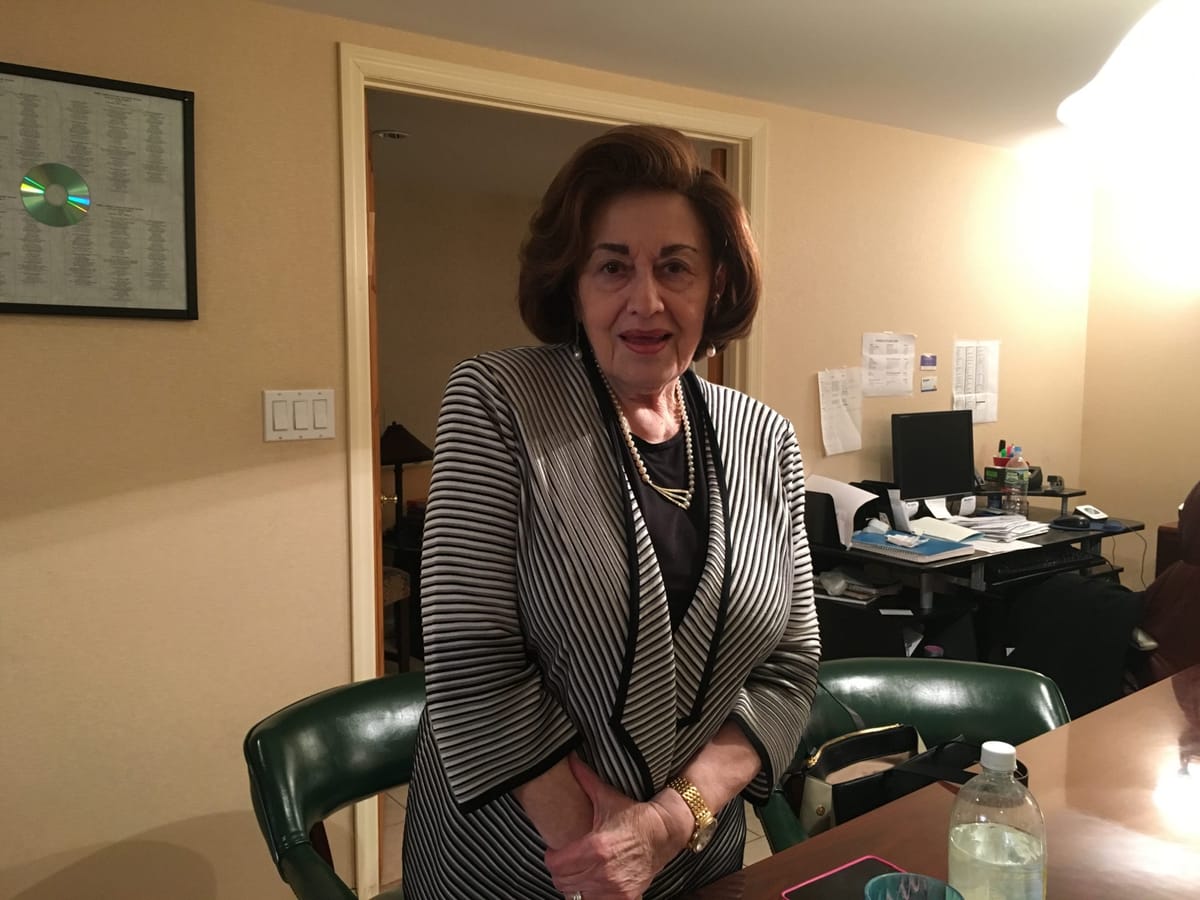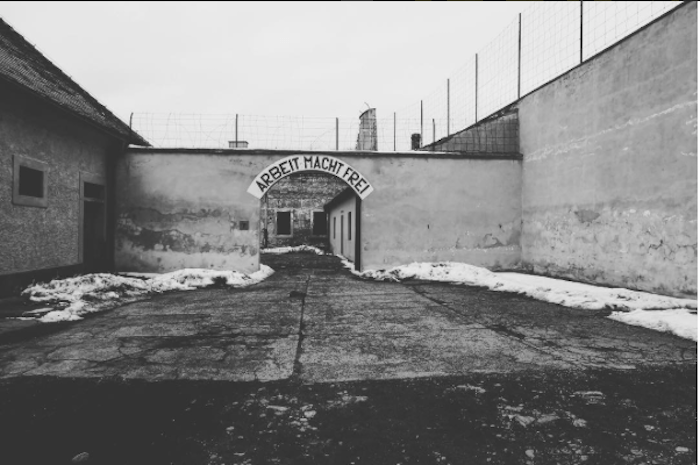Care & Chutzpah: How A Holocaust Survivor Cleaned Up Brooklyn Nursing Homes


At first glance, it’s hard to tell that Mrs. Olga Lipschitz, legendary nursing home administrator and holocaust survivor, is a rebel.
Since arriving in the United States in 1946 after liberation from a concentration camp, she’s she’s effortlessly set the standard for heart and chutzpah — defying expectations for an Orthodox woman and elbowing her way into a male-dominated industry.
And at 85, Lipschitz is sharp, smartly dressed, feisty, and animated.
“I had four little babies but I was never satisfied with just being a little housewife,” she said, about living in Crown Heights in the 1970s. “But I was an Orthodox Jewish woman, and I was bound — at that time, we weren’t even allowed to drive.”
Refusing to cower, Lipschitz earned her driver’s license (my teacher used to tell me “you were born in the saddle!”), administrator’s degree at Long Island University, and eventually a job as the Deputy to the Commissioner of Health in Albany. And though her independence was a hard pill for her family to swallow, “Deep down, I know my mother was proud of me,” she said.
Transforming pain into a career built on care
Her diverse life experiences seemed to fall into place the day she stepped into a Brooklyn nursing home to volunteer in the 1970s.
“What we saw there, nobody should ever see. I couldn’t believe I was in U.S.– I saw this before in a concentration camp,” Lipschitz said, spilling horror stories about patients relegated to beds and wheelchairs, unkempt and disheveled. “They were laying in their own dirt, a lot of them were developmentally and physically disabled teenagers. It was shocking,” she said.
And the more Lipschitz learned about the standards for elderly care, the clearer her mission became. “There was a deep rotten scandal in the industry. Nursing homes weren’t supervised, people got away with literally murder,” she said.
Cleaning up the elderly care industry
Care is the foundation for her rehabilitation philosophy, a conviction instilled by her grandfather in Hungary and imprinted by a life-changing train ride to Auschwitz concentration camp.
In her career, Lipschitz tackled three Brooklyn facilities — Cobble Hill, Sheepshead Nursing and Rehabilitation Center, and Haym Salomon. At Cobble Hill, a 500-bed facility, she built her reputation as a bullish and loyal proprietor, armed to transform an industry riddled with scandal.
Her fireball personality even sparked celebrity attention, when she enlisted Keith Hernandez’s fundraising help. “I knew all the players, I loved baseball and followed it religiously. I knew everybody’s hitting average!” she laughed.
But when the health commissioner transferred her to the Sheepshead Bay facility in 1980, she faced “a mess like I’ve ever seen before.”
The owners had forced unions out and were paying laborers five dollars an hour. And when she walked into their office, she found it completely wiped of all financial records. “‘It’s a new day, there’s nothing here,'” she said to her first employee. “‘You and I will start by hiring some people, and we’ll do what needs to be done.’”
From the rubble, she built a fiercely loyal team and a five-star facility with the help of Jerome Kahan, Administrator and COO. “She set the example, she went on the floors herself,” said Nini Rubin, Director of Communications. “Everyone knew that she cared. They would go through fire and water for her, no matter where she was.”
Today, Sheepshead Nursing & Rehabilitation is run by her son-in-law, as the first facility in Brooklyn to provide physical therapy outside of a hospital setting. But Lipschitz paved the way by transforming the industry’s psychological stigma. “People think of a nursing home as a place where people go to die. But it’s not that anymore,” she said, noting the minimum 80 short-term beds in Sheepshead.
“I nursed my grandfather. He taught me everything he thought a Jewish girl should know. He was sick and old and didn’t see. I was his light,” she said, remembering when she lived modestly with her six siblings, parents, and grandfather — until the Germans quarantined them into a ghetto in 1944.
Lipschitz, who now lives in Borough Park, said she never used to speak about what happened to her. Inspired by her brother’s words, she’s making an effort now because “the time will come when they’ll be nobody left who was a witness,” she said.

A childhood interrupted
“I lived in a fool’s paradise and didn’t keep up with the clouds overtaking Europe,” she said, of the years between 1940 when her father was forced to close his watchmaking shop and 1944 when the Germans marched into her Hungarian village.
But her father, who had immigrated to America in 1940, sent the family visa papers one moment too late.
The family crowded into the office of the American Embassy on December 7, 1941, when the heavy doors of admission were sealed shut. “We were sitting in the office for a whole day,” Lipschitz remembered somberly. “My mother with the six little ones and a baby on her arm.”
When officials announced the attack on Pearl Harbor, “Everyone in the office began screaming, but not my mother. She sat like a piece of stone. It hit her so hard,” she said.
After a few years in the ghetto, her siblings and exhausted mother were packed like sardines into a train car in the middle of summer. Thus began the worst two weeks of her life, starved of water and food, watching people die one by one in front of her young eyes.
“My mother carried vinegar in a little bottle and she used to smear it on our mouths. But our lips got too swollen,” she said. “My feelings were despair, at least what a child can feel.”
What happened next, Lipschitz believes, was the intervention of a Hungarian Rabbi who saved Jewish children throughout the war.
“We arrived at Auschwitz, and waited on the train for hours, waiting for someone to open the door. Those of us that were still alive, anyway. Then, they just turned the train around and we started back out,” she said. Days later, the passengers were dumped into a field while SS officers lined them up and made selections, which she remembers through a feverish haze.
“We were on the forefront, my mother, my sister, my brothers, and me in the middle,” she said, noting that if half a family was work-ready they were sent to the right. The officer held onto my shoulder and asked if I could work. My sister pinched my back and said in Hungarian, ‘Say yes, say yes’.”
The family was sent to a work camp where they manufactured boxes for ammunition, said Lipschitz, still remembering the scores in the cardboard. “Even now, I can remember how they were made, it was a whole art by itself,” she said, reliving a memory dampened by ravaging hunger.
“In the camp, it was the hunger. Constant. You pick up grass and eat it because you don’t care,” she said, remembering the kindness of strangers — like Russian prisoners who threw extra potato peels into the barracks from their kitchen shift, or a woman from town who gave her mother cans of beer.
“To this day, I can’t stand the smell of beer,” she grimaced.
The family was eventually taken to Theresienstadt, an interim work camp in Chekoslovakia built upon a system of mines, only weeks before it was liberated by American soldiers.
But out of her devastating childhood, grew a deep commitment — and a road map — for leaving the world a better place than she found it. “You learn to have a lot of feeling, and those feelings give you a direction,” she said.
“I am disappointed when people have everything and don’t give,” she said, reflecting on the current challenges refugees face entering the United States. “I came into this country and I found haven.”
But she could have just as easily been turned away, she said, noting the New York Times Op-Ed comparing historical concerns over admitting Jewish World War II refugees to today’s Syrian refugees. “There were a lot of Jews that were turned away by President Roosevelt. He had a quota,” she said, “and many were worried that holocaust survivors were spies.”




